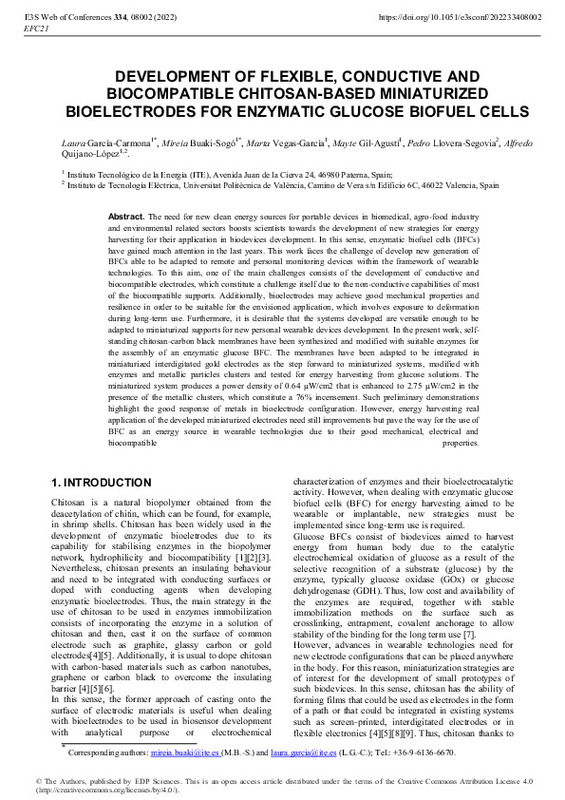JavaScript is disabled for your browser. Some features of this site may not work without it.
Buscar en RiuNet
Listar
Mi cuenta
Estadísticas
Ayuda RiuNet
Admin. UPV
Development of Flexible, Conductive and Biocompatible Chitosan-Based Miniaturized Bioelectrodes for Enzymatic Glucose Biofuel Cells
Mostrar el registro sencillo del ítem
Ficheros en el ítem
| dc.contributor.author | García-Carmona, Laura
|
es_ES |
| dc.contributor.author | Buaki-Sogo, Mireia
|
es_ES |
| dc.contributor.author | Vegas-García, Marta
|
es_ES |
| dc.contributor.author | Gil Agustí, María Teresa
|
es_ES |
| dc.contributor.author | Llovera Segovia, Pedro
|
es_ES |
| dc.contributor.author | Quijano-Lopez, Alfredo
|
es_ES |
| dc.date.accessioned | 2023-01-17T07:26:31Z | |
| dc.date.available | 2023-01-17T07:26:31Z | |
| dc.date.issued | 2021-12-17 | es_ES |
| dc.identifier.issn | 2267-1242 | es_ES |
| dc.identifier.uri | http://hdl.handle.net/10251/191352 | |
| dc.description.abstract | [EN] The need for new clean energy sources for portable devices in biomedical, agro-food industry and environmental related sectors boosts scientists towards the development of new strategies for energy harvesting for their application in biodevices development. In this sense, enzymatic biofuel cells (BFCs) have gained much attention in the last years. This work faces the challenge of develop new generation of BFCs able to be adapted to remote and personal monitoring devices within the framework of wearable technologies. To this aim, one of the main challenges consists of the development of conductive and biocompatible electrodes, which constitute a challenge itself due to the non-conductive capabilities of most of the biocompatible supports. Additionally, bioelectrodes may achieve good mechanical properties and resilience in order to be suitable for the envisioned application, which involves exposure to deformation during long-term use. Furthermore, it is desirable that the systems developed are versatile enough to be adapted to miniaturized supports for new personal wearable devices development. In the present work, selfstanding chitosan-carbon black membranes have been synthesized and modified with suitable enzymes for the assembly of an enzymatic glucose BFC. The membranes have been adapted to be integrated in miniaturized interdigitated gold electrodes as the step forward to miniaturized systems, modified with enzymes and metallic particles clusters and tested for energy harvesting from glucose solutions. The miniaturized system produces a power density of 0.64 ¿W/cm2 that is enhanced to 2.75 ¿W/cm2 in the presence of the metallic clusters, which constitute a 76% incensement. Such preliminary demonstrations highlight the good response of metals in bioelectrode configuration. However, energy harvesting real application of the developed miniaturized electrodes need still improvements but pave the way for the use of BFC as an energy source in wearable technologies due to their good mechanical, electrical and biocompatible properties. | es_ES |
| dc.description.sponsorship | This work has been supported by the Generalitat Valenciana towards Instituto Valenciano de Competitividad Empresarial (IVACE) in accordance with the IMAMCL/2020/1 agreement and within the framework of the BioSensCell and BioCell-Power projects. | es_ES |
| dc.language | Inglés | es_ES |
| dc.publisher | EDP Sciences | es_ES |
| dc.relation.ispartof | E3S Web of Conferences. Volume 334, 2022 | es_ES |
| dc.rights | Reconocimiento (by) | es_ES |
| dc.subject.classification | INGENIERIA ELECTRICA | es_ES |
| dc.title | Development of Flexible, Conductive and Biocompatible Chitosan-Based Miniaturized Bioelectrodes for Enzymatic Glucose Biofuel Cells | es_ES |
| dc.type | Comunicación en congreso | es_ES |
| dc.type | Artículo | es_ES |
| dc.identifier.doi | 10.1051/e3sconf/202233408002 | es_ES |
| dc.relation.projectID | info:eu-repo/grantAgreement///IMAMCL%2F2021%2F1//BioCell-Power. Prototipo de biopila enzimática para aplicaciones de energy harvesting/ | es_ES |
| dc.relation.projectID | info:eu-repo/grantAgreement///IMAMCL%2F2019%2F1//BioSensCell. Bioelectrodos enzimáticos para pilas de combustible biológico y sistemas sensores/ | es_ES |
| dc.relation.projectID | info:eu-repo/grantAgreement///IMAMCL%2F2020%2F1//BioSensCell. Bioelectrodos enzimáticos para pilas de combustible biológico y sistemas sensores/ | es_ES |
| dc.relation.projectID | info:eu-repo/grantAgreement///IMAMCL%2F2021%2F1//BioSensCell. Bioelectrodos enzimáticos para pilas de combustible biológico y sistemas sensores/ | es_ES |
| dc.rights.accessRights | Abierto | es_ES |
| dc.contributor.affiliation | Universitat Politècnica de València. Escuela Técnica Superior de Ingenieros de Caminos, Canales y Puertos - Escola Tècnica Superior d'Enginyers de Camins, Canals i Ports | es_ES |
| dc.contributor.affiliation | Universitat Politècnica de València. Escuela Técnica Superior de Ingenieros Industriales - Escola Tècnica Superior d'Enginyers Industrials | es_ES |
| dc.description.bibliographicCitation | García-Carmona, L.; Buaki-Sogo, M.; Vegas-García, M.; Gil Agustí, MT.; Llovera Segovia, P.; Quijano-Lopez, A. (2021). Development of Flexible, Conductive and Biocompatible Chitosan-Based Miniaturized Bioelectrodes for Enzymatic Glucose Biofuel Cells. EDP Sciences. 1-6. https://doi.org/10.1051/e3sconf/202233408002 | es_ES |
| dc.description.accrualMethod | S | es_ES |
| dc.relation.conferencename | European Fuel Cells and Hydrogen Conference (EFC 2021) | es_ES |
| dc.relation.conferencedate | Diciembre 15-17,2021 | es_ES |
| dc.relation.conferenceplace | Online | es_ES |
| dc.relation.publisherversion | https://doi.org/10.1051/e3sconf/202233408002 | es_ES |
| dc.description.upvformatpinicio | 1 | es_ES |
| dc.description.upvformatpfin | 6 | es_ES |
| dc.type.version | info:eu-repo/semantics/publishedVersion | es_ES |
| dc.relation.pasarela | S\456603 | es_ES |








